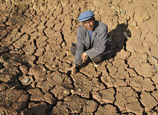
The current drought in the North Island of New Zealand may dampen milk production in the country this year and cause milk powder prices to rise, which would add greatly to the costs of Chinese importers, experts said Monday.
The drought is said to be the region's worst in at least 30 years, and may cause dairy product production on the North Island to fall 15 percent from a year ago, the Shanghai-based Jiefang Daily newspaper reported Sunday.
Chinese companies imported 75,367 tons of milk powder and cream from New Zealand in the first month of this year, exceeding the whole year's quota for a preferential tariff rate, China's General Administration of Customs said on January 28.
Remaining imports will be subject to a duty of around 10 percent, which will also increase the prices of imported dairy products.
"Importers are afraid that milk powder prices may rise further, so they made their orders earlier this year," Chen Lianfang, a dairy analyst at Beijing Orient Agribusiness Consultants, said Monday.
Chinese companies' enthusiasm toward New Zealand milk powder shows that their confidence in the product was not much affected by a dicyandiamide scandal in January this year, Chen noted.
At present, 70 to 80 percent of China's imported milk powder comes from New Zealand.
Wang Dingmian, director of the Guangzhou Dairy Industry Association, said that prices of imported milk powder have increased by 16 percent each year for the past five years.
"If the drought were to get worse, prices of imported milk powder could be hiked by more than 16 percent this year," Wang told the Global Times.
But Wang noted that the price hike will not come until the second half of the year, as importers place orders several months before selling the products.
Also, the southern part of New Zealand has seen milk production increase by around 5 percent this year, which may help to ease the supply pressure, Wang said Monday.
Chen noted that China will rely even more on foreign milk powder in the future, as it is unlikely that consumers will regain confidence in domestic dairy products in the next few years.
China imported around 1.1 million tons of dairy products in 2012, up from 140,000 tons back in 2008, according to Chen. "The number will rise to around 1.3 million this year," he predicted.
Due to distrust in domestically produced dairy products, Chinese consumers have been rushing to seek out foreign milk powder, which has caused discontent recently in countries and regions whose dairy supplies are being depleted.
Starting from March 1, the Hong Kong Special Administrative Region Government stopped allowing people traveling out of the region to carry more than 1.8 kilograms of powdered formula for children. And similar bans have recently appeared in some European countries such as the UK, the Netherlands and Germany.
















 Recruitment of flight security officers attracts capable men
Recruitment of flight security officers attracts capable men


![]()
